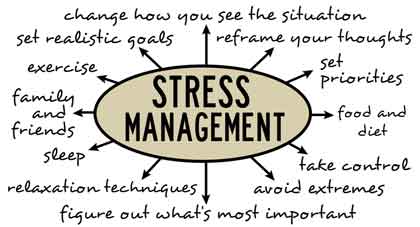Stress seems to be a part of living in the modern world; it is something everyone has to cope with whether we admit it or not. Yet it seems that stress in itself is not necessarily bad. It is a person’s reactions to stress that cause problems and result in more medical and psychological problems than any other cause, from colds to cancer, heart disease, substance abuse, depression, and mental illness. A stressed-out person is less likely to follow an exercise regime or pay much attention to proper diet or sleeping habits, makes more mistakes, is often short-tempered and is miserable to be around. So what can one do about stress supplement? Three proven techniques for stress reduction are meditation, exercise, and developing a positive attitude.
Meditation for Stress Reduction

Meditation is extremely effective in helping one cope with stress. Stress by its very nature is energy-depleting, to the point where a person suffering from constant stress becomes so fatigued that they are in danger of experiencing clinical depression. Meditation promotes a state of relaxation and improves sleep. It may even allow one to more easily give up addictions like cigarette smoking or alcohol abuse, both of which increase susceptibility to the negative consequences of stress. By meditating on a mantra or on one’s breath, attention is taken from everyday worries and placed upon a neutral vehicle, which allows a build-up of natural energy. Meditating only 15 or 20 minutes a day will provide up to eight hours of focused energy. With increased energy will come better insight into the nature of stress reactions and solutions to mitigate those reactions.
Start Exercising for Stress Reduction
Exercise invigorates and strengthens cardiovascular functioning. It promotes the development of healthy blood cells that produce antibodies to combat stress-induced disease. It releases endorphins that give energy and induces a natural state of well being. The problem is that people experiencing stress find it difficult to begin exercising. Start with short walks, then gradually make them longer and more vigorous. Find someone to walk with, and talk about something other than what is stressing you out. Above all, make exercise fun. Try Pilates, or yoga, or dance. Exercise will also result in improved sleep which makes one less susceptible to the effects of stress.
Develop a Positive Attitude and Think Your Way Free of Stress
Having practiced in the field of psychiatric social work for over fifteen years and given numerous lectures on stress, it is my opinion that the single most important ingredient in fighting stress is developing a positive attitude toward life in general. Stress can make one cynical and focused on the negative. Fight this with positive thinking and constantly giving thanks for all the good things in your life. We may not have a lot of control over what happens to us as we go through life, but we do have a great deal of control over how we react to and think about those events. Whether the glass is half full or half empty is up to you to decide. Have a little faith that good things are coming your way. Remember that expectations are fulfilled, so think accordingly. Look into various philosophies that promote a positive outlook. Read books like The Secret for inspiration. Start a hobby to take your mind off the same old stuff. Have a little fun. Just as negativity can be a bad habit, focusing on the positive can become a good habit.

